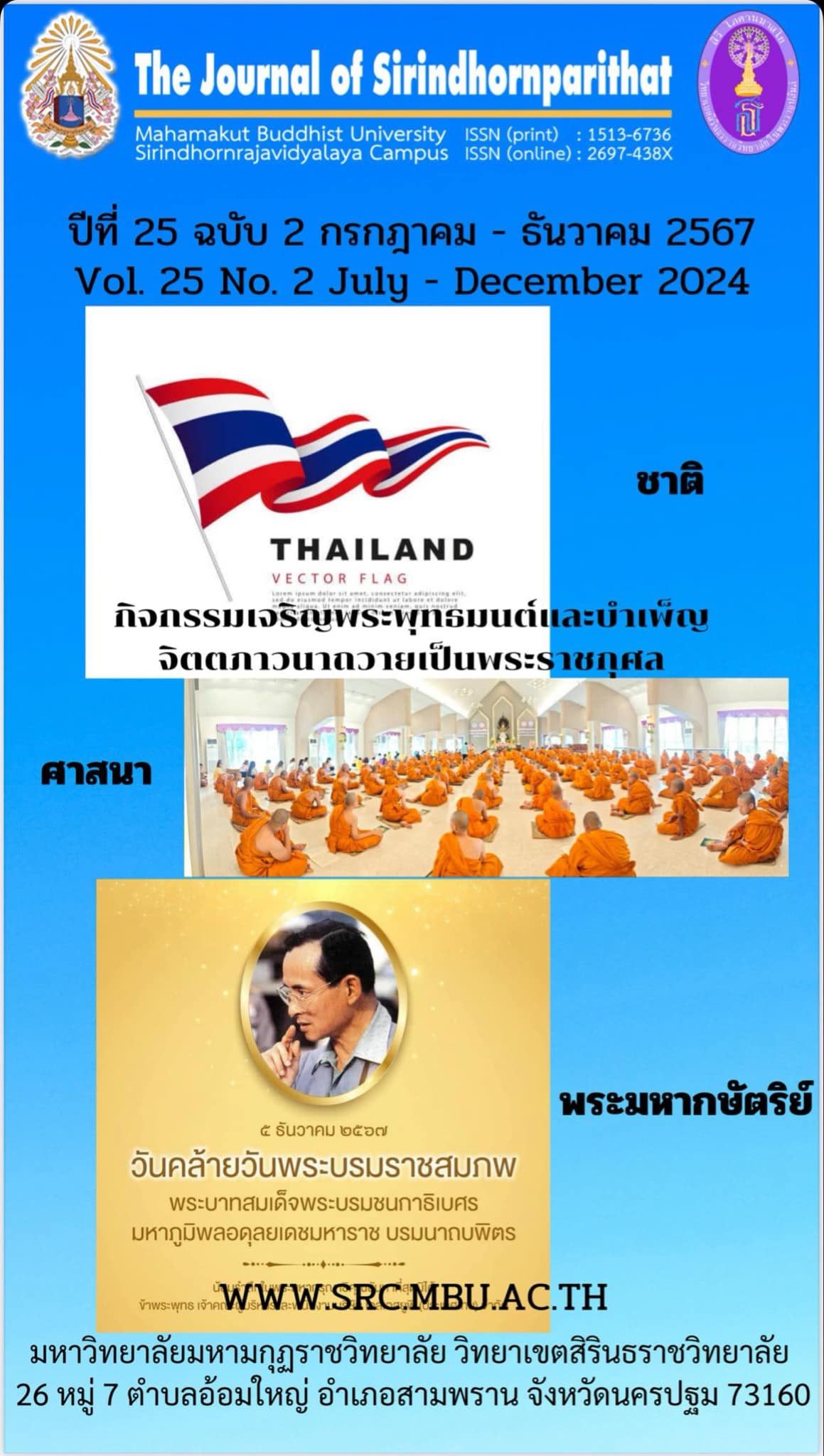Good Governance Administration Affecting Conflict Management Of School Administrators Under Kanchanaburi Primary Educational Service Area Office 2
Keywords:
Governance According to Good Governance Principles, Conflict ManagementAbstract
The objectives of this research are to study the governance according to good governance principles of school administrators, the conflict management of school administrators, and the impact of governance according to good governance principles on the conflict management of school administrators in the Kanchanaburi Primary Educational Service Area Office 2. The sample used in this research consists of 284 school administrators and teachers in the Kanchanaburi Primary Educational Service Area Office 2, selected through random sampling. The research instrument is a 5-point Likert scale questionnaire, with content validity ranging from 0.67 to 1.00 and a reliability of 0.98. The statistics used for data analysis include percentage, mean, standard deviation, and multiple regression analysis, with the significance level set at 0.01.
The findings were as follows 1) Governance according to good governance principles in the Kanchanaburi Primary Educational Service Area Office 2 is overall at a high level. When considering each aspect, it was found that all aspects were practiced at a high level. The order according to the average score is as follows: the principle of morality and ethics, the principle of equality, the principle of participation and consensus orientation, the principle of decentralization, the principle of openness and transparency, the principle of effectiveness, the principle of accountability and auditability, the principle of efficiency, the principle of responsiveness, and the principle of the rule of law. 2) Conflict management of school administrators in the Kanchanaburi Primary Educational Service Area Office 2 is overall at a moderate level. When considering each aspect, it was found that certain aspects were practiced at a high level, ordered by average score as follows: compromise, cooperation, and accommodation. For aspects practiced at a low level, ordered by average score, they are avoidance and competition and 3) Governance according to good governance principles has an impact on conflict management of school administrators in the Kanchanaburi Primary Educational Service Area Office 2. Overall, the governance principle of responsiveness (X3) has a predictive coefficient of 0.036 with statistical significance at the 0.01 level. It can predict 3.60% of the conflict management of administrators, and the regression equation can be formulated as = 2.48 + 0.18X3 หรือ Y = 0.19X3
References
กนกวรรณ ไตรภพ. (2563). แนวทางการพัฒนาการบริหารตามหลักธรรมาภิบาลเพื่อสร้างแรงจูงใจในการปฏิบัติงานของครู สังกัดสำนักงานเขตพื้นที่การศึกษาประถมศึกษาพระนครศรีอยุธยา เขต 1. วิทยานิพนธ์ครุศาสตรมหาบัณฑิต สาขาวิชาพุทธบริหารการศึกษาบัณฑิตวิทยาลัย มหาวิทยาลัยมหาจุฬาลงกรณราชวิทยาลัย.
ดิเรก อุทรทวิการ ณ อยุธยา. (2561). กลยุทธ์การบริหารความขัดแย้งในองคก์ารของผู้บริหาร โรงเรียนอ่างศิลาพิทยาคม อำเภอเมืองชลบุรี จังหวัดชลบุรี. ปริญญานิพนธ์การศึกษามหาบัณฑิต สาขาวิชาการบริหารการศึกษา มหาวิทยาลัยบูรพา.
นภัสนันท์ ศรีคุณ. (2559). แนวทางการใช้หลักธรรมาภิบาลของผู้บริหารในการบริหารสถานศึกษา สังกัดสำนักงานเขตพื้นที่มัธยมศึกษา เขต 27. ปริญญานิพนธ์การศึกษามหาบัณฑิต สาขาวิชาการบริหารการศึกษา มหาวิทยาลัยมหาสารคาม.
นัฐพล หงส์มาลา. (2564). การจัดการความขัดแย้งของผู้บริหารสถานศึกษา สังกัดสำนักงานเขตพื้นที่การศึกษาประถมศึกษาชัยภูมิ เขต 3. การค้นคว้าอิสระครุศาสตรมหาบัณฑิต สาขาวิชาการบริหารการศึกษา มหาวิทยาลัยราชภัฏชัยภูมิ.
รัชยา ภักดีจิตต์. (2557). ธรรมาภิบาลเพื่อการบริหารภาครัฐและเอกชน. (พิมพ์ครั้งที่ 2). กรุงเทพมหานคร: จุฬาลงกรณ์มหาวิทยาลัย.
วิเชียร วิทยอุดม. (2559). พฤติกรรมองค์การ. กรุงเทพฯ: ธีระฟิล์มและไซเท็กซ์.
ศตวรรษ ปานธรรม. (2564). ความคิดเห็นของข้าราชการครูต่อการบริหารงานตามหลักธรรมาภิบาลของผู้บริหารสถานศึกษากลุ่มเกาะแก้ว สังกัดสำนักงานเขตพื้นที่การศึกษาประถมศึกษาระยอง เขต 1. สารนิพนธ์ศึกษาศาสตรมหาบัณฑิต สาขาวิชาการบริหารการศึกษา มหาวิทยาลัยนอร์ทกรุงเทพ.
สำนักงานเขตพื้นที่การศึกษาประถมศึกษากาญจนบุรีเขต 2. (2562). รายงานการวิเคราะห์การประเมินคุณธรรม และความโปร่งใสในการดําเนินงานของสำนักงานเขตพื้นที่การศึกษา. ค้นจาก https://www.kan2.go.th/offline/images/6300/6307/o42.pdf.
สำนักงานคณะกรรมการพัฒนาระบบราชการ. (2555). หลักธรรมาภิบาลของการบริหารกิจการ บ้านเมืองที่ดี. กรุงเทพฯ: คณะรัฐมนตรีและราชกิจจานุเบกษา.
อริย์ธัช แก้วเกาะสะบ้า. (2560). หลักธรรมาภิบาลในรัฐธรรมนูญแห่งราชอาณาจักรไทย พุทธศักราช 2560. กรุงเทพฯ: สำนักงานเลขาธิการสภาผู้แทนราษฎร.
เอกวิทย์ ทับทวี, พระมหาอุดร อุตตโร (มากดี), ปฏิธรรม สำเนียง และพระครูศรีสุธรรมนิวิฐ. (2567). การบริหารความขัดแย้งของผู้บริหารในโรงเรียนขยายโอกาสทางการศึกษาจังหวัดชัยนาท. วารสารวิจยวิชาการ, 7(2), 129-146.
Best, J. W. (1981). Research in education (4th ed.). New Jersey: Prentice Hall.
Cronbach, L. J. (1951). Coefficient alpha and the internal structure of tests. Psychometrika, 16(3), 297-334.
Krejcie, R. V., & Morgan, D. W. (1970). Determining sample size for research activities. Educational and Psychological Measurement, 30(3), 607-610.
Thomas, K. W., & Kilmann, R. H. (1987). Thomas-Kilmann conflict mode interest. New York: X/ com Incoporated.
Downloads
Published
Issue
Section
License
Copyright (c) 2024 Mahamakut Buddhist University

This work is licensed under a Creative Commons Attribution-NonCommercial-NoDerivatives 4.0 International License.
บทความที่ได้รับการตีพิมพ์เป็นลิขสิทธิ์ของ มหาวิทยาลัยมหามกุฏราชวิทยาลัย วิทยาเขตสิรินธรราชวิทยาลัย
ข้อความที่ปรากฏในบทความแต่ละเรื่องในวารสารวิชาการเล่มนี้เป็นความคิดเห็นส่วนตัวของผู้เขียนแต่ละท่านไม่เกี่ยวข้องกับหาวิทยาลัยมหามกุฏราชวิทยาลัย วิทยาเขตสิรินธรราชวิทยาลัย และคณาจารย์ท่านอื่นๆในมหาวิทยาลัยฯ แต่อย่างใด ความรับผิดชอบองค์ประกอบทั้งหมดของบทความแต่ละเรื่องเป็นของผู้เขียนแต่ละท่าน หากมีความผิดพลาดใดๆ ผู้เขียนแต่ละท่านจะรับผิดชอบบทความของตนเองแต่ผู้เดียว




